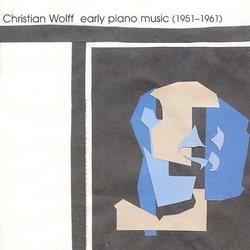| All Artists: Christian Wolff Title: Early Piano Music Members Wishing: 0 Total Copies: 0 Label: Matchless Release Date: 1/1/2002 Genres: Jazz, Special Interest, Classical Styles: Avant Garde & Free Jazz, Experimental Music, Chamber Music, Historical Periods, Modern, 20th, & 21st Century, Instruments, Electronic Number of Discs: 2 SwapaCD Credits: 2 UPC: 786497521425 |
Search - Christian Wolff :: Early Piano Music
 | Christian Wolff Early Piano Music Genres: Jazz, Special Interest, Classical
|
Larger Image |
CD Details |
CD ReviewsBeautiful introspective music of abstraction,quite different scarecrow | Chicago, Illinois United States | 10/14/2006 (5 out of 5 stars) "The early piano-focused music of Christian Wolff is part of the repertoire that we often forget, now given his more interesting political music, piano solos and pieces from the Left perspective different kinds of philosophic concerns, as his impressive Ives-ian 12 "preludes" from the early Eighties, and his other piano solos, "to the disappeared", "Bread and Roses". The early piano music however is distinguishable from the somewhat giant shadows cast by ubiquitous Cage himself,the indefatiguable Feldman and parcelled Earle Brown,all primary contributors in grand style of the avant-garde to the genre of the piano solo. Wolff however had his own interest,his own voice; he for example in the prepared piano music here, utilized different preparations than Cage, often quite minimal to coax discreet timbres, not the large panopoly, gamelan predictable one Cage had developed.Wolff composed music vertical down the page at times.So his early music here is more private, reserve, instrospective, as his other creations as the chamber "Burdocks", and later political "Braverman Music".
This is what Tilbury does best, creating beautiful sounds from the most coldly written calculated music. Wolff's music is sparce, and remains so herein. Largely self-taught, his music has like a fascinating "blind-spot" in it, but one that he nurtures and brings something unimaginable to the music. I only go by the results, and his music has points of interest if it falls in the right hands. Sometimes it doesn't and suffers from a yawn of a bore.Performers think that Wolff's music has a conceptual eternal element inside it,and you simply play whats written. That leads to useless uninteresting readings. But here Tilbury knows these traps and has lived with this repertoire his entire existence. Great that Matchless set aside their agenda to devote to Wolff not a cashbox thunder. You hear Wolff playing piano as well with Tilbury in the "Duo for Pianists" I and II. Again understatement has its effect, the less is more ontology at work herein." |

 Track Listings (13) - Disc #1
Track Listings (13) - Disc #1